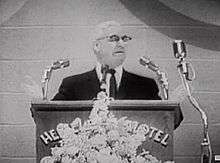George S. Benson

George Stuart Benson (September 26, 1898, Dewey County, Oklahoma – December 15, 1991, Searcy, Arkansas) was a missionary to China, 1925–36; founder and principal, Canton Bible School, 1933–1936; president, Harding College, 1936–1965; chancellor, Oklahoma Christian University, 1956-1967.
Education
Graduated in first class of Harper College, 1923; B.A., Harding College, 1925; B.S., Oklahoma A&M University, 1925; M.A., University of Chicago, 1931. He received several honorary doctorates including those from Harding University, 1932; Knox College (Illinois), 1948;[1] and Oklahoma Christian University, 1968.
Career
George S. Benson started his career of religious and political education as a missionary to what is now Guangzhou, China for eleven years, 1925-1936. The Communists forced him out of China in 1936, an experience which led him to adopt as his life's mission opposition to socialism and communism. Early in his career as president of Harding College, he established on campus the National Education Program (NEP) to pursue these ends, working closely with Harding professor James D. Bales. Conducting a broad range of activities, including a film series, and both a nationally syndicated newspaper column and radio show by Benson, its activities reached many millions of Americans. As a result of these activities, Harding and the NEP were widely known for an association with patriotism and free-enterprise information in America. This represented a dramatic turn from the anti-political and pacifist values of founding influences James A. Harding and David Lipscomb. Naturally, this nationalism resonated both with its proponents and its opponents. "Benson initially resisted overtures by students and faculty to begin the process of desegregating Harding, but in the fall of 1963 he announced that the school would be admitting its first black students."[2] About this time, Harding College also received its first substantial national opposition and criticism in the news media, much of it in association with criticism of the movement supporting the Barry Goldwater campaign.
Benson influenced nationalist agendas at other Church of Christ-related institutions also. The American Studies Institute at Abilene Christian College and the American Citizenship Center at Oklahoma Christian University were among the programs initially modeled on his work at Harding with the NEP. Following his resignation from the presidency of Harding in 1965, he continued to assist in the development of several other Church of Christ-related institutions, including Oklahoma Christian University, Lubbock Christian College, Alabama Christian College (Now Faulkner University), and George Pepperdine College. Benson also exerted a significant influence on the political culture of Churches of Christ. While some Churches of Christ saw this as a favorable development, others saw it as an abandonment of early values, and this conservative and nationalistic emphasis received substantial criticism beginning in the mid-60s.
Buildings are named in his honor at Harding University, Freed Hardeman University, Faulkner University, and Oklahoma Christian University. The George Benson Christian College is located in Zambia, Africa on the Namwianga Mission site.
Honors
Benson was a recipient of the Tax Foundation's Distinguished Service Award in 1941 . Dr. Benson was inducted into the Oklahoma Hall of Fame in 1972 and to the Oklahoma State University Hall of Fame in 1976 .
External links
- Oklahoma Christian University History Through The Ages - George Benson
(http://www.oc.edu/ochistory/view.asp?ID=George_S._Benson)
- The War We Are In, Part 2 - Televised speech by Dr. Benson
- Knox College Honorary Doctorate Recipients
- Burial site
- Encyclopedia of Arkansas History and Culture
Bibliography
Missionary Experiences. Edmond, OK. 1987.
Hicks, L. Edward (1994). Sometimes in the Wrong But Never in Doubt: George Benson and the Education of the New Religious Right. Knoxville. ISBN 0-87049-865-7.
Stevens, John C. (1991). Before Any Were Willing: The Story of George S. Benson. Searcy, AR.
? (1963), George S. Benson: Conservative, Anti-Communist, Pro-American Speaker, Ph.D dissertation, Wayne State Univ.
Altman, Ted (1970), The Contributions of George S. Benson to Christian Education, Ed.D dissertation, North Texas University
Notes
- ↑ Knox College, Honorary Degrees (retrieved 2010 July 22).
- ↑ http://www.encyclopediaofarkansas.net/encyclopedia/entry-detail.aspx?entryID=3495
